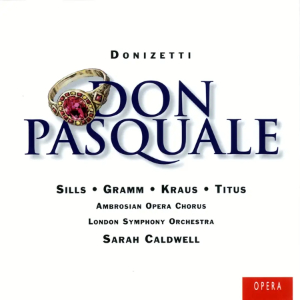
Gaetano Donizetti (1797–1848)
Don Pasquale, Opera buffa in three acts (1843)
Don Pasquale – Donald Gramm (bass-baritone)
Norina – Beverly Sills (soprano)
Dr Malatesta – Alan Titus (baritone)
Ernesto – Alfredo Kraus (tenor)
Un notario – Henry Newman
Ambrosian Opera Chorus
London Symphony Orchestra/Sarah Caldwell
rec. 1978, Studio No. 1, EMI Abbey Road, London, UK
Warner Classics 5660302 [2 CDs: 122]
Donizetti’s opera buffa is one of the most charming stage comedies ever penned. The composer and librettist loosely based it on the 1609 Ben Jonson comedy The Silent Woman, but in Jonson’s play the Norina character is of course a boy in female disguise; Richard Strauss would also be inspired by the same play to write his under-appreciated opera Die Schweigsame Frau for Dresden in 1935. Donizetti’s opera was created for the Théâtre-Italien in Paris and had its premiere in 1843. With a cast of four of the most celebrated singers of the day creating the roles (Giulia Grisi, Giovanni Mario, Luigi Lablache and Antonio Tamburini) the opera was a sure-fire hit right from the outset and remains so when it is produced today.
The cast of this 1978 recording is not quite the star-studded line-up as in those premiere performances in Paris, but it does contain two great singers of the 20th century who, it must be admitted, were just a little bit past their peak performing years. The main reason this recording went forward was to document Beverly Sill’s charmingly vivacious Norina, the role with which she decided to close her career at the Metropolitan Opera, only a year after this recording was made. Sills is a very generous performer in everything she does and her Norina is no exception. Her characterization is warm and funny, especially her over-the-top expressions as “Sofronia”, which comes hurtling out of one’s sound system with full comic effect intact . This has not dated despite the 46 years that have passed since this was made. The other interesting aspect of Sill’s performance is that she never comes across as a “soubrette” unlike most other sopranos who essay the role. She is a woman in command of the situation and, after all, Norina is supposed to be a widow. However, it must be admitted that by this time Sills’ voice has started to fray on any note above a G. Still, where other sopranos who have been recorded merely shine in the role (Graziella Sciutti, Mirella Freni and Barbara Hendricks, to name three) Sills scintillates and she can transfix the listener, despite her diminished vocal powers. Even today, her trill remains the most perfect oscillation between two notes that I have ever heard.
Alfredo Kraus seems ageless despite being a 51 year old man singing an ingénu role. His Ernesto has charm and a directness of manner that suit this earnestly romantic young man who is carried away by his straightened circumstances. Kraus was always a master technician of bel canto style, and his slender sound and elegant phrasing win me over each time I hear him. Like Sills, the passage of time shows itself although in Kraus’ case a sort of dryness to his upper range emerges which doesn’t impede the quality of his singing in any way. His was not a large voice and in his otherwise exemplary performance of “Cercherò lontana terra” he concludes the cabaletta with a high C sharp that does not project well and which gets partly submerged by the orchestra. In live performances I’ve heard from him, he left that high note out, which is a far more effective conclusion to the scene.
Donald Gramm’s Pasquale is a perfectly acceptable performance in every way, although his soft-grained tone, while undeniably attractive on its own terms, simply does not possess the Italianate bite associated with a buffo basso. He is quite good at surmounting the challenges of the patter singing, and he displays a singularly impressive low E at the conclusion of the quartet ”E’ rimasto là impietrato”.
Alan Titus is a boyish sounding Malatesta and his characterization of the role projects ebullient good humour. However, despite the undeniably attractive sounds he makes, there is more to be mined from this role than he delivers; one needs only to turn to Leo Nucci’s very animated and idiomatic performance on the Muti recording (review) to hear what can be achieved when an Italian performer tackles this role with gusto, demonstrating that he was raised with long established buffo traditions in his blood.
Sarah Caldwell was a well-known conductor in North America during the 1970s and 80s. I believe this was the only commercial recording that she made. She is an interesting choice, because the first thing that grabs the attention is that her pacing seems to be on the leisurely side of things; however, there is much more going on here than just slower tempi. Caldwell certainly understands a thing or two about dramatic contrast and how tempi can be juxtaposed to maximum effect. When she does quicken the pacing (for example when Ernesto interrupts the mock wedding), the sudden contrast stands in high relief compared with what has gone before and produces an interesting frisson. The London Symphony and the Ambrosians execute things in a thoroughly professional manner. By the conclusion of the opera, the entire experience leaves one wanting to listen all over again. One can’t ask for more than that from any recording. The Muti recording is still the first choice for a CD version of Don Pasquale but there are wonderful benefits to this recording that make it a decent alternative version.
Mike Parr
Buying this recording via a link below generates revenue for MWI, which helps the site remain free



















